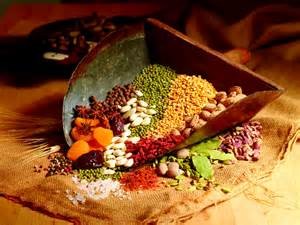Elimination of red meat (beef, pork, lamb, game meat):
Some people call themselves vegetarians if they avoid red meat, even though they are still eating other animal products.
There is no problem with this diet choice—cutting down on or avoiding red meat entirely decreases saturated fat intake, which can improve heart health. Cutting back on red meat can also help the environment. Large animals, such as cattle and pigs produce a lot of greenhouse gases and use very large amounts of water and land for the amount of food they provide!

Pescatarian diet eliminates red meat and poultry, but allows fish.
Lacto-ovo vegetarian diet eliminates all animal flesh, but allows dairy products and eggs.
Nutritional concerns:
- Iron: Growing children and teens and menstruating women have high iron needs. The most absorbable sources of iron come from animal flesh, so when it is eliminated, low iron intake can be a problem . With some planning, to include plenty of plant based sources of iron, this does not need to be a problem. If your child or teenager has low iron stores or is anemic, an iron supplement may be necessary.
- Protein: It is not difficult to meet protein needs with either of these diets. You want to use a combination of vegetable protein sources (beans, nuts, seeds, whole grains) and dairy, eggs and fish (if you are pescatarian). If you were to get all your protein with eggs and cheese, you would end up eating a lot of saturated fat, which can increase risks for heart disease.
Vegan diet eliminates ALL animal products
Nutrition concerns
Protein: It is very important to include vegetable sources of protein at each meal and snack. Legumes (beans, peas and lentils) combined with whole grains (wheat, quinoa, rice, barley, oats, corn, rye, millet…..) and nuts or seeds are excellent ways to get protein. Using soy products, such as Tofu, edamame, soy milk, soy yogurts are great ways to further increase protein intake.
Iron: Careful planning to include plenty of plant sources of iron is essential, especially for women and kids. In some cases a supplement will be needed.
Vitamin B12: This vitamin is ONLY found in animal products. It is very important to take a vitamin B12 supplement if you are not eating any animal products. Our needs for B12 are very low (2.4 micrograms/day), but deficiency causes a type of anemia (“pernicious anemia”) and neurological effects; prevention is the best cure!
Calcium: We get the majority of our calcium from dairy products. It requires some planning to make sure you are getting enough if you are not eating these. Leafy green vegetables such as kale and collards, broccoli, soy milk, and foods made with calcium such as tofu (if it is “calcium set”) as well as foods and beverages that are fortified with calcium such as calcium fortified orange juice, almond, rice, or coconut milk, and many breakfast cereals.
Regardless of what type of diet we choose to follow, we need to do some planning to make sure that we are meeting all of our nutritional needs. More planning is necessary if we are going to eliminate any food group from our diet. Everyone benefits from lots of fruits and vegetables, and from eating some vegetarian proteins, even if we still eat meat.
